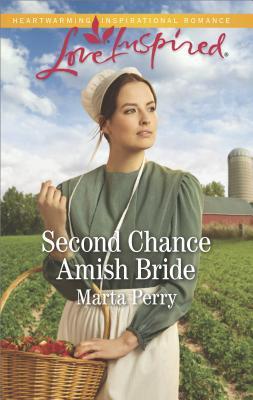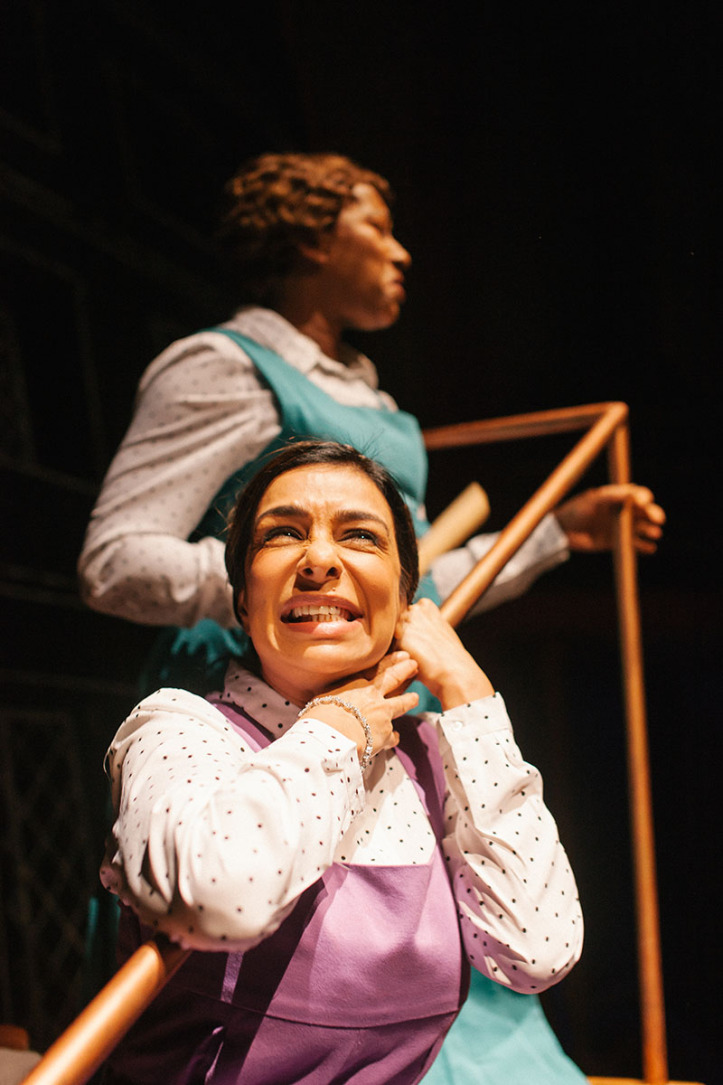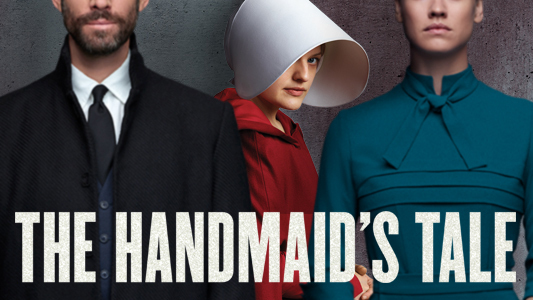
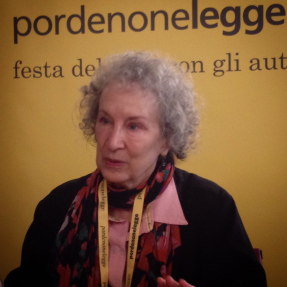 Let’s start the new year with the Alternative Review of a series that I honestly loved, not only for its adaptation from a book I read, but because it took me back to my first year of graduate school (the first time I attended, not the second) when I took a class in Canadian Literature and I studied Margaret Atwood‘s artwork. Who would have thought I would meet her in person something like ten years later at a book festival held close to where I used to live? Well, it happened, and here I am now, talking about the TV-series they made out of her novel The Handmaid’s Tale: simply genius. Another book I loved from Atwood was The Edible Woman, so once you’re done watching the show and reading the book (because really, you have to!) I would recommend catching up with all of her works. So actual, so accurate, so powerful. Do it, you fools!
Let’s start the new year with the Alternative Review of a series that I honestly loved, not only for its adaptation from a book I read, but because it took me back to my first year of graduate school (the first time I attended, not the second) when I took a class in Canadian Literature and I studied Margaret Atwood‘s artwork. Who would have thought I would meet her in person something like ten years later at a book festival held close to where I used to live? Well, it happened, and here I am now, talking about the TV-series they made out of her novel The Handmaid’s Tale: simply genius. Another book I loved from Atwood was The Edible Woman, so once you’re done watching the show and reading the book (because really, you have to!) I would recommend catching up with all of her works. So actual, so accurate, so powerful. Do it, you fools!
When I talked about the #metoo movement, I wanted to focus on the message that Annalise Keating from HTGAWM tried to pass, because reviewing The Handmaid’s Tale was not part of the plan, yet. Now, I am not here to write a paper on a novel and its relationship with culture, or language, or god knows what other connection I should have found if I still were in graduate school. Nevertheless, I would like to push a little on what lies beyond the mere watching of a show for the sake of it, and take out some food for thoughts, you know, just for conversation… Let’s just consider this statement: my body, my choice. I will not go deeper into it, I’m just leaving it here and you’ll see why.
 Many have talked about the novel as one of the most feminist of the eighties, why yes, people, Atwood wrote it in 1984 and her feminist views are kind of obvious back then, if you study her works, but what was outstanding about her ways of showing ideals (and it still is remarkable also now, after watching the show) is the fact that it does not feed your brain with concepts and beliefs, instead she raises questions, she wants her readers to reach their own conclusions by simply reporting a truth, although through fictional events, that are still too real, so far.
Many have talked about the novel as one of the most feminist of the eighties, why yes, people, Atwood wrote it in 1984 and her feminist views are kind of obvious back then, if you study her works, but what was outstanding about her ways of showing ideals (and it still is remarkable also now, after watching the show) is the fact that it does not feed your brain with concepts and beliefs, instead she raises questions, she wants her readers to reach their own conclusions by simply reporting a truth, although through fictional events, that are still too real, so far.
How can it be feminist, if in the episodes we see women tortured and subjugated? Women are the only victims in the society of the Republic of Gilead – the fictional community in the show, subdued by men to the point that they lose their identity, their name, and they become a property of their owners: Ofglen… Offred, literally of-someone. Despite their annihilation, we hear their thoughts, and if we can’t, we see it in their eyes, we perceive what they would like to express and they would definitely all be part of the #metoo movement now, I guess!
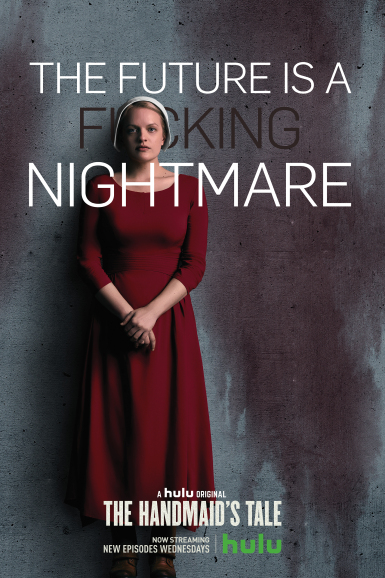 The show begins with Offred (who is not Offred yet) and her husband, trying to escape from the police to save their child. Other details of her past are showed only through Offred’s memories and flashbacks, because from the moment they capture her, we only see her new life at Gilead. After a civil war, the United States have created a totalitarian government based on “Christian” rules. For some odd reasons, women are not fertile anymore, and they need to resort to a sort of surrogate mothers in order to have babies. What will happen though, is that these surrogate mothers are handmaids, they get impregnated by the most powerful men of the Gilead republic and they leave their children with the family that abused of them. They get assigned to their owners and they must undergo a treatment, a ritual, more easily said a f* rape, in order to give the family a child. Society is divided into classes (again?), handmaids are dressed in red (oh, by the way, read also The Scarlet Letter by Hawthorne when you get a chance!), marthas – housekeepers and cooks- wear green, and wives wear blue. Of course we could not miss the prostitutes for those elite men in need of … well, they’re men, so at Jezebel’s there are women who work in secret brothels to satisfy them. Not to be contentious (or am I) but what I saw through all the episodes does not deviate much from what I see everyday. Of course the story is exaggerated (I mean, it is first a novel and then a television adaptation of it, so it has to be a little fictional, don’t you think?) but, as I said before, it gives food for thoughts and I would appreciate to know what this TV shows creates in your …guts. About the colors and the perfect contrast the filmmakers decided to create, well, I’ll touch this topic later, waiting for season two, and after I’ll get more experience on the field… eh-hem.
The show begins with Offred (who is not Offred yet) and her husband, trying to escape from the police to save their child. Other details of her past are showed only through Offred’s memories and flashbacks, because from the moment they capture her, we only see her new life at Gilead. After a civil war, the United States have created a totalitarian government based on “Christian” rules. For some odd reasons, women are not fertile anymore, and they need to resort to a sort of surrogate mothers in order to have babies. What will happen though, is that these surrogate mothers are handmaids, they get impregnated by the most powerful men of the Gilead republic and they leave their children with the family that abused of them. They get assigned to their owners and they must undergo a treatment, a ritual, more easily said a f* rape, in order to give the family a child. Society is divided into classes (again?), handmaids are dressed in red (oh, by the way, read also The Scarlet Letter by Hawthorne when you get a chance!), marthas – housekeepers and cooks- wear green, and wives wear blue. Of course we could not miss the prostitutes for those elite men in need of … well, they’re men, so at Jezebel’s there are women who work in secret brothels to satisfy them. Not to be contentious (or am I) but what I saw through all the episodes does not deviate much from what I see everyday. Of course the story is exaggerated (I mean, it is first a novel and then a television adaptation of it, so it has to be a little fictional, don’t you think?) but, as I said before, it gives food for thoughts and I would appreciate to know what this TV shows creates in your …guts. About the colors and the perfect contrast the filmmakers decided to create, well, I’ll touch this topic later, waiting for season two, and after I’ll get more experience on the field… eh-hem.
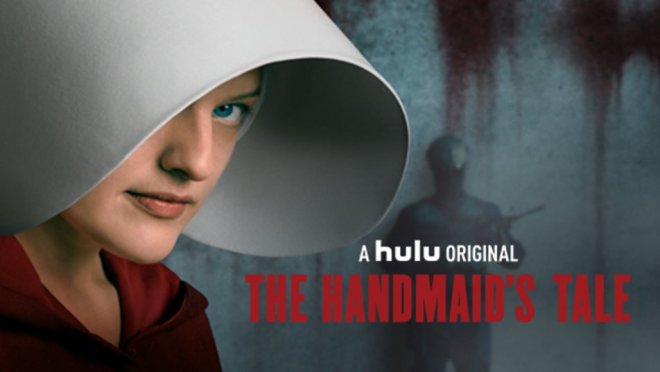
The Handmaid’s Tale
Genre: they want to call it “dystopian fiction drama”
Created by: Bruce Miller
Based on: The Handmaid’s Tale by Margaret Atwood
Starring: Elisabeth Moss, Joseph Fiennes, Yvonne Strahovski, Alexis Bledel, Madeline Brewer, Ann Dowd, O. T. Fagbenle, Max Minghella, Samira Wiley
Watched on: Hulu
One Season, Ten Episodes watched in: two mornings.
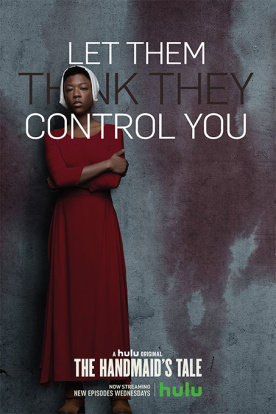 June (name that in the novel is never mentioned but left for granted) played by the Emmy and Golden Globe winner Elisabeth Moss, is the Handmaid of the Waterford family. Commander Fred (Joseph Fiennes) and his wife Serena Joy (the beautiful, amazing Yvonne Strahovski – Sarah in “Chuck“) want to have a baby and Offred has to go through the ritual in order to fulfill their desire. As all the handmaids she has to stick to rules or she will be punished. While she is a handmaid she remembers the past, when she was married, had a daughter, a best friend (who is later captured to be a handmaid first and at jezebel later), a life… all things that now have to be forgotten. Serena Joy was once a powerful businesswoman though a little conservative, and I will never understand how she gave in to this project, and she is actually part of the problem and one of the promoters (but I am not going to spoil the whole story, read the freaking book!); there is also Nick, the Commander’s driver and part of the Eye, some sort of FBI who reports traitors to be captured and punished, or killed. Commander Waterford one night invites Offred into his office to play a game and talk, until he starts treating her differently, just to use a euphemism. She uses this to her advantage later asking for favors, but eventually Serena Joy finds it out and… of course everything is already messed up by then. In fact the Commander seems to be the one who is not fertile and Serena Joys plans sexual intercourses between Offred and Nick, until they eventually get emotionally attached. She finally gets pregnant pretending it is the Commander’s baby, as planned, but 100% it is Nick’s. A few other events happen in the meantime, such as suicides, murders, heavy punishments like “female genital mutilation surgery“, escape attempts and more, but I would suggest to just watch the whole series as I am not going to spoil it. Uh, uh. It is worth watching and most of all, worth reading, so get off the net and start doing your homework. You’re welcome.
June (name that in the novel is never mentioned but left for granted) played by the Emmy and Golden Globe winner Elisabeth Moss, is the Handmaid of the Waterford family. Commander Fred (Joseph Fiennes) and his wife Serena Joy (the beautiful, amazing Yvonne Strahovski – Sarah in “Chuck“) want to have a baby and Offred has to go through the ritual in order to fulfill their desire. As all the handmaids she has to stick to rules or she will be punished. While she is a handmaid she remembers the past, when she was married, had a daughter, a best friend (who is later captured to be a handmaid first and at jezebel later), a life… all things that now have to be forgotten. Serena Joy was once a powerful businesswoman though a little conservative, and I will never understand how she gave in to this project, and she is actually part of the problem and one of the promoters (but I am not going to spoil the whole story, read the freaking book!); there is also Nick, the Commander’s driver and part of the Eye, some sort of FBI who reports traitors to be captured and punished, or killed. Commander Waterford one night invites Offred into his office to play a game and talk, until he starts treating her differently, just to use a euphemism. She uses this to her advantage later asking for favors, but eventually Serena Joy finds it out and… of course everything is already messed up by then. In fact the Commander seems to be the one who is not fertile and Serena Joys plans sexual intercourses between Offred and Nick, until they eventually get emotionally attached. She finally gets pregnant pretending it is the Commander’s baby, as planned, but 100% it is Nick’s. A few other events happen in the meantime, such as suicides, murders, heavy punishments like “female genital mutilation surgery“, escape attempts and more, but I would suggest to just watch the whole series as I am not going to spoil it. Uh, uh. It is worth watching and most of all, worth reading, so get off the net and start doing your homework. You’re welcome.

Share this:


